Foyle Autumn Nutrition Event
and live on Freeview channel 276
Over 120 farmers attended the event which included Foyle suppliers from around Ulster as well as local beef producers.
Highlights from the event included talks from Andrew Clarke, Foyle Food Group, Gareth Anderson, FarmGate Nutrition and Jennifer Howse, speaking on the importance of mental health in the red meat sector.
Advertisement
Advertisement
Groups of farmers were taken on a tour of the farm, where areas of research were highlighted, and the most recent developments were on show. Research is frequently conducted on methods of improving efficiency, reducing input costs, and improving animal welfare whilst also reducing greenhouse gas emissions.
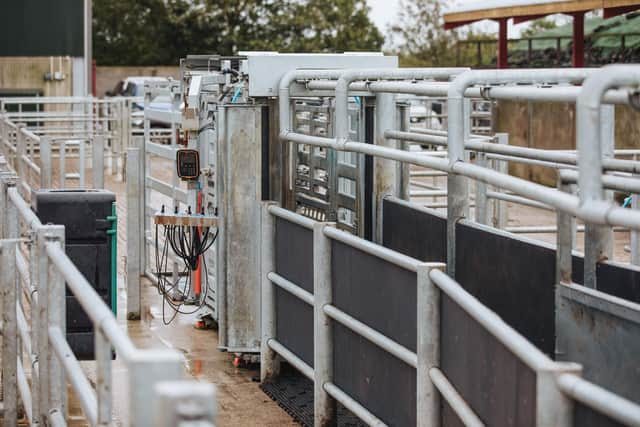

Foyle focus heavily on knowledge transfer partnerships with their suppliers and these events encourage positive discussions about future beef farming practices.
Brushes and Bokashi
Cattle brushes have been found to be a key driver of performance on the Foyle farm. Findings have shown 0.2kg/head/day liveweight gain in trials conducted on Aberdeen Angus cattle. Similar trials are planned to go ahead later in the year to potentially assess the cause of this increased performance.
‘Bokashi’, was also a topic of interest. This involves adding a microorganism mixture into bedding and ensiling it for eight weeks once it is mucked out, creating an anaerobic environment.
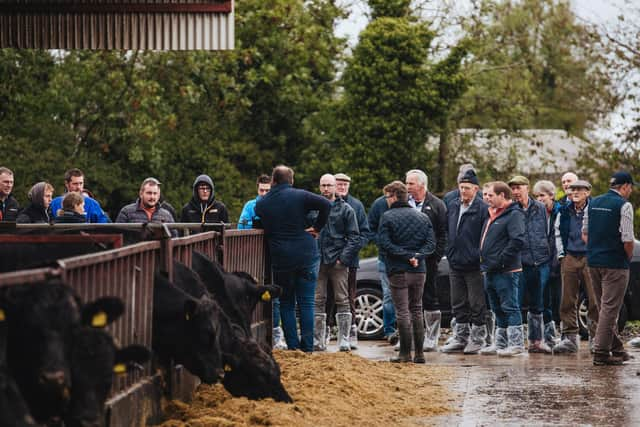

Advertisement
Advertisement
This manure management strategy is used on the farm to break down organic matter more easily for soil application. Therefore, energy and carbon are retained in the bokashi end product, stimulating soil microbiology, improving soil fertility and preventing carbon loss as CO2.
Infrastructure
Farmers were taken to Foyle’s new shed, the design of which demonstrates a high level of animal welfare. Maximum levels of natural light captured facilitate the evaporation of moisture from the soft bedded lye back area, reducing bedding costs as much as possible. Other features include polycarbonate roof sheeting, mono-pitch design, open sides and an automatic climate control curtain. Collectively these contribute to maintaining a consistent environment for cattle, minimising the incidence of respiratory disease and reducing energy costs.
Also, an automatic slurry aeration system within the tank maintains slurry in a semi-liquid state for use when required. This removes the need for mixing slurry benefitting staff safety and minimises disturbance to cattle.
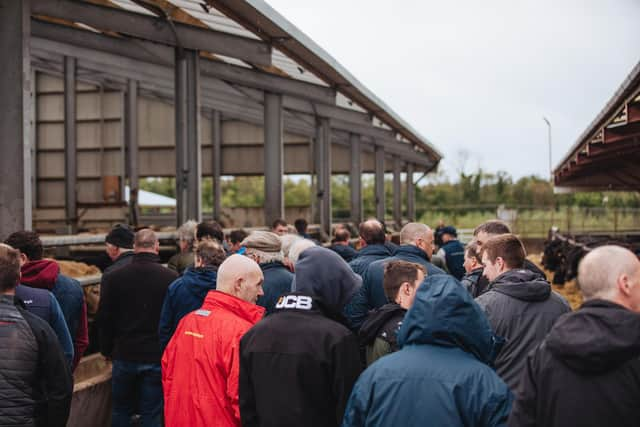

Staff safety is a major element of concern within the new handling facilities at the farm which were completed in 2022. There are manscapes in every pen, eliminating the need for staff to go inside the pen with cattle at any point.
Advertisement
Advertisement
Also, the layout meets the company’s commitments to improving animal welfare. There are anti-jump rails, anti-backing bars, a double race which merges into single file, auto drafting technology and grooved concrete flooring. Additionally, the ‘budbox design’ obeys natural behavioural principles, encouraging animals to go back from where they came from and go around the handler.
Feed Bunks
Foyle have adopted a feed bunk management system which is useful in their aim of feeding cattle to peak intake and meeting the focus of maximising feed efficiency. This theory has originated from research conducted by the South Dakota University. They have found that finishing beef cattle should be fed to 99 per cent of their maximum dry matter intake to ensure optimal performance. Also, the quantity of feed provided to cattle must match the amount the animals can consume without causing digestive upsets.
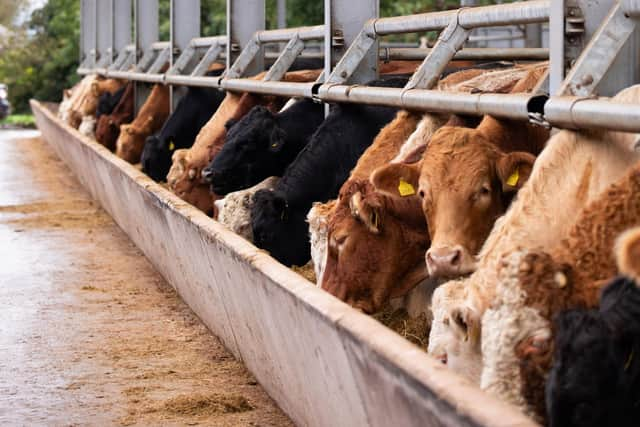

Following feeding, bunkers are assessed based on the residual feed remaining. A score of 0-0.5 is ideal, or as little feed remaining as possible. This ensures staff can see previous feed is consumed and cleaned up as much as possible. Feeding regimes at the Foyle farm are kept consistent daily, with each feed being provided at the same time in the morning and evening. Fed is also pushed up in the early afternoon to drive intakes and increase cattle performance.
Management
The visitors gathered in the farm’s meal shed for the remaining talks of the day.
Advertisement
Advertisement
Andrew Clarke, Lead Farm Liaison at Foyle Food Group, addressed the audience on current work the company is completing including their Superior Genetics Programme in collaboration with Aberdeen Angus Quality Beef. They have been and are continuing to encourage suppliers to use bulls of high genetic merit as the benefits have been demonstrated with Foyle’s own bull, ‘Elliot Bravo’. Trials with this sire have found reductions in finishing age by 40 days. Using top sires for traits such as 200 or 400-day weights has the potential to improve progeny weight by approximately 18.5kg without considering any other management tools.
Andrew also discussed the grazing platform in operation on the farm. Rotational pasture systems are in place as well as a multispecies platform. Despite challenges faced with weed growth within the multispecies sward, this has shown to reduce the requirement for anthelmintic application which has been positive.
Nutrition
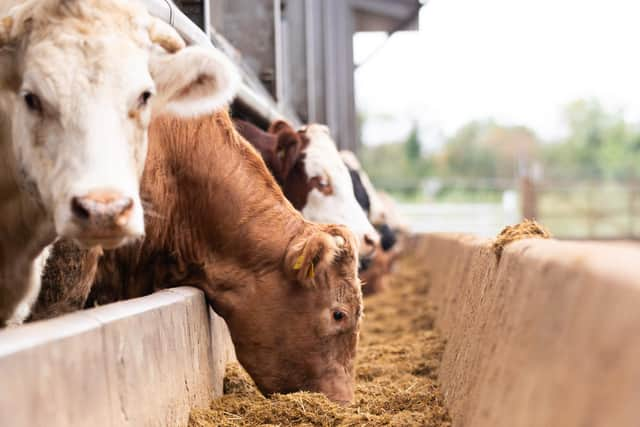

Gareth Anderson from FarmGate nutrition spoke to the audience on the total mixed ration used on the finishing farm. The guidelines he discussed for finishing diets includes a target DMI of two per cent plus body weight, high energy dense diets of around 12MJ/kg DM, starch and sugar inclusion of >20 per cent, crude protein between 12 and 14 per cent and fibre content of >25 per cent. Gareth emphasised the principle of higher dry matter intake correlating with higher liveweight gain.
Aspects of good practice were highlighted, such as good pit face management, regular forage analysis, consistent mixing and access to clean water. Gareth explained several different sources of starch and sugars, protein, fibre as well as alternative feed additives including Elensis. This product improves daily liveweight gain as well as has methane-reducing properties, as trialled on the Foyle farm. He finished with talking through examples of beef blends which are appropriate for the Autumn period.
Mental Health
Advertisement
Advertisement
Jennifer Howse, a PhD student from the Royal Agricultural University and previous agricultural liaison at Foyle Food Group addressed the importance of mental health in the red meat sector.
This message included advice of ways in which farmers can think about positive ways to approach the challenges they face within farming and managing their business. She emphasised the importance of aiming to tackle the initial struggles or signs of mental ill health before they begin to build up. Jennifer also discussed the isolation farmers can often feel and encouraged the audience to talk to each and reach out if they are struggling.
She offered ‘five-a-day checklist’ for farmers and those in the farming community to refer to:
1.Be honest with yourself and those around you
2.Talk openly about daily challenges & LISTEN
3.Care for yourself as well as you care for others
4.Contact that person you’ve been saying you should
5.Plan for the unexpected – make the right choices
Donations were received following the talks for Rural Support, a local listening and signpost service for farmers and farming families across NI.
The event closed with a BBQ with steaks provided by Foyle Food Group.